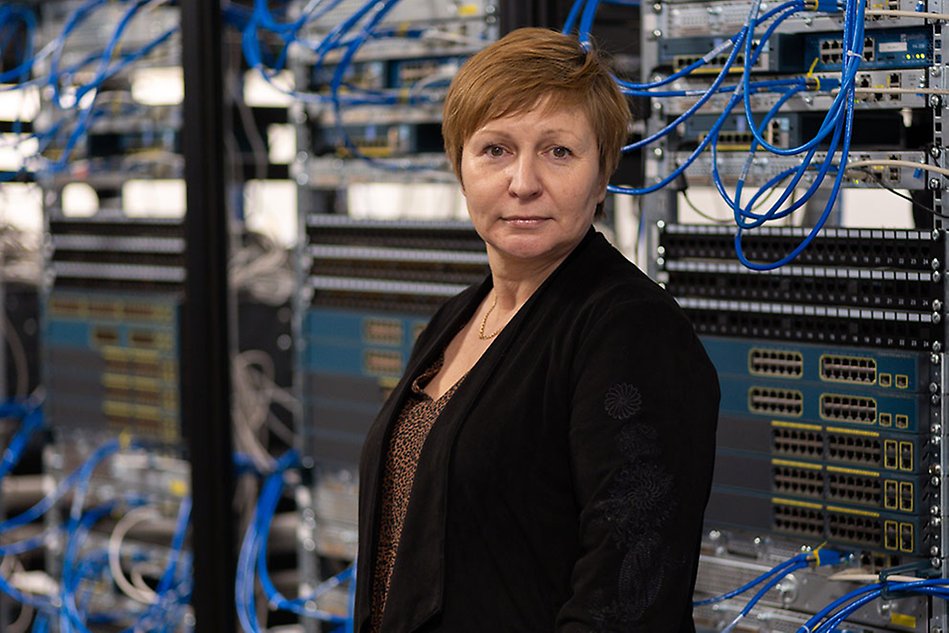Hacking competition strengthens competence in cybersecurity
On December 15, this year’s Capture the Flag hacking competition took place. It was organised by students and faculty at the University. Students solved various IT-related challenges for a few hours to enhance their skills in countering cyber threats. Additionally, this year’s competition included new interdisciplinary elements.
The goal is to create an educational platform to be utilised by police organisations across Europe. This aids in increasing knowledge and combating cybercrime.
Olga Torstensson
The Capture the Flag (CTF) competition varies in its design from year to year but always focuses on solving IT-related problems. Participants may need to identify program vulnerabilities, crack encryption, or search for information on social media accounts to uncover passwords. This year’s challenges were developed by students from the University’s programmes in IT Forensics and Information Security and the Master’s Programme in Network Forensics in collaboration with students from the Belgian university La Haute École de Namur-Liège-Luxembourg.

Olga Torstensson is the Programme Director for the Master’s Programme in Network Forensics.
“New this year was the collaboration with the EU-funded project, the European Cybercrime Training and Education Group (ECTEG), and the CTF had interdisciplinary elements and was scenario-based. In addition to technical challenges, participants were required to discuss communication strategies and make decisions based on laws and regulations,” says Olga Torstensson, Programme Director for the Master’s Programme in Network Forensics.
Participating universities
- Halmstad University, Sweden
- La Haute École de Namur-Liège-Luxembourg, Belgium
- Franko National University of Lviv, Ukraine
- Université du Québec à Trois-Rivières, Canada
- Erasmus Brussels University of Applied Sciences, Belgium
- Politihøgskolen, Norway
Learning new skills
Participating in the competition can be rewarding and beneficial for students, especially those interested in areas such as cybersecurity, programming and IT.
“Students get to test their theoretical knowledge in a practical way, think critically and creatively, and step outside the box. By working in groups, they practice developing their collaboration and communication skills, and in the competition, they are exposed to new techniques and methods that broaden their knowledge base,” says Olga Torstensson, adding:
“CTF competitions create opportunities for students to network with like-minded individuals from different countries and cultures. It adds valuable knowledge for the individual student but is also crucial for global perspectives on cybersecurity.”
Enhancing knowledge in cybersecurity
The ECTEG project collaborates with the University through the competition. Within the project, several universities and representatives from various European law enforcement agencies work together. The project’s teaching team representing Halmstad University consists of Lilla Pankaczi, Olga Torstensson, Muhammad Ahsan Rasool and Ove Andersson.
“The goal is to create an educational platform to be utilised by police organisations across Europe. This aids in increasing knowledge and combating cybercrime,” says Olga Torstensson.

Student Stephanie Huang Karlsson was involved in organising this year’s CTF.
Stephanie Huang Karlsson, a final-year student in the IT Forensics and Information Security programme
What is your role in the CTF competition?
“I have been part of the organising group and also served as the communications coordinator.”
What happens during CTF, and who participates?
“The University’s CTF, HH-CTF, is an annual competition that is now part of the ethical hacking course in our programme. There are also participants from the Master’s Programme in Network Forensics at the University and students from a university in Belgium. We have been planning and organising this CTF competition for a few months.”
Why is it important to participate in a CTF?
“It’s a very fun and social way to tackle various IT-based problems together with others. New this year is that the competition is more realistic, which is not always the case. We have worked on that so that students can practice more hands-on in cybersecurity.”
Have you participated in several CTF competitions?
“Yes! And I am the President of the newly started student association HjärterHex here at Halmstad University. The purpose of it is that we should learn more about cybersecurity and delve into different subjects together. The board usually organises CTF competitions for members to participate in and test their skills. We also have a CTF team at the University, so we usually participate in several CTF competitions each year.”
Text: Anna-Frida Agardson
Pictures: Anna-Frida Agardson
Mer information
IT-forensics and Information Security
Master’s Programme in Network Forensics

